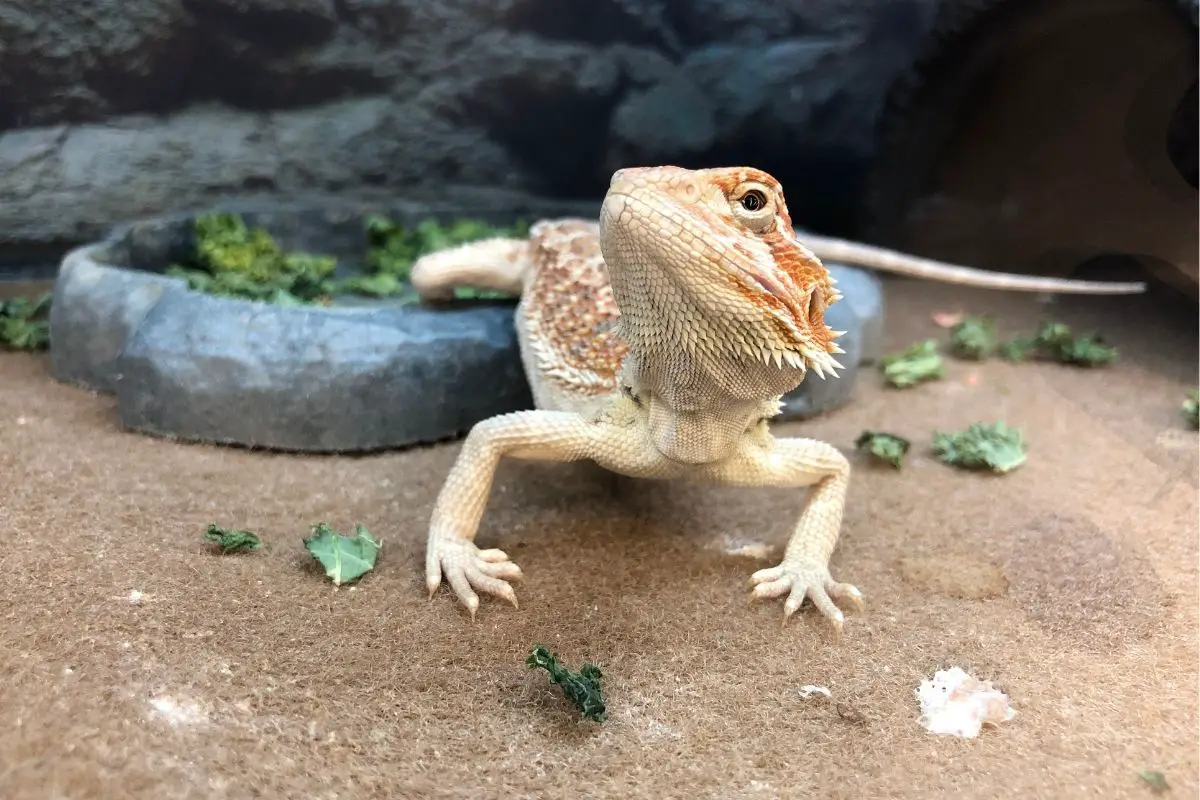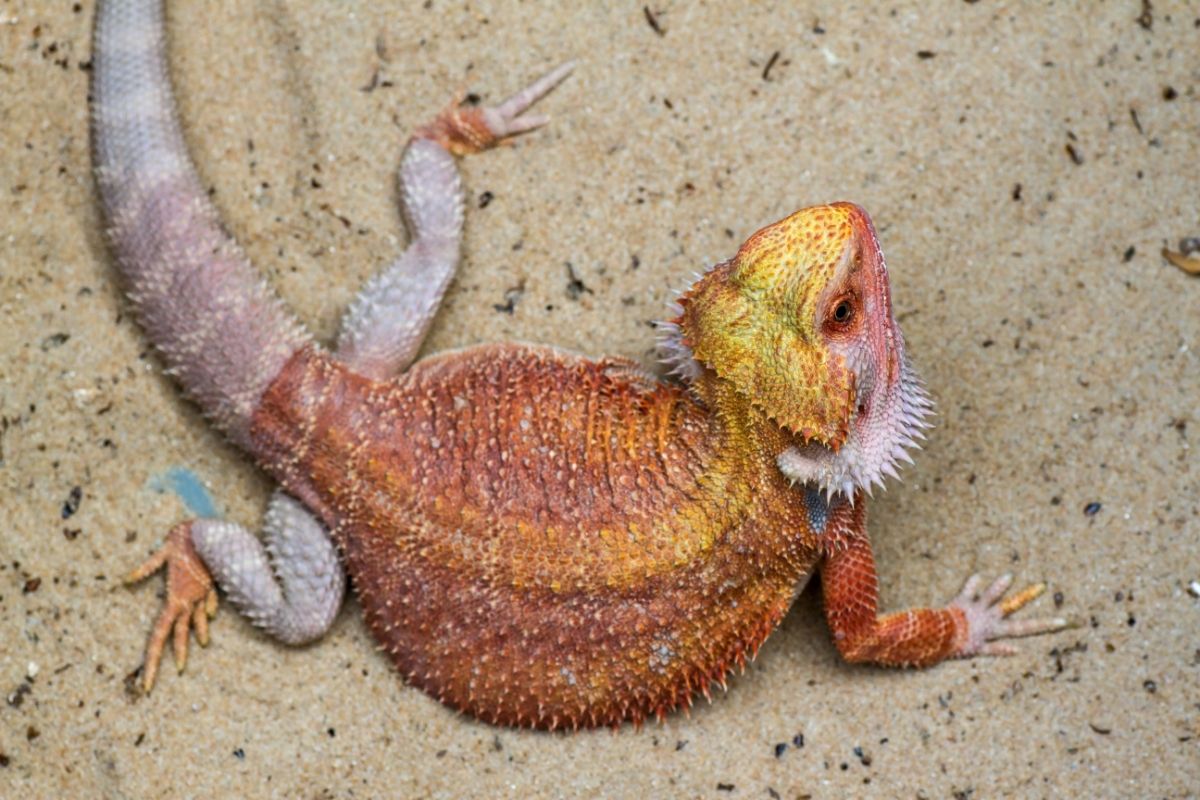The bearded dragon is one of the most popular reptiles for keeping as a pet. It’s a very hardy animal with a long lifespan of up to 20 years in some cases, and it’s easy to care for.
But when you have a reptile that lives indoors all day, it can get boring, and start looking for other things to do.
The best way to keep your bearded dragon happy and healthy is to provide him or her with plenty of space to roam around and exercise their body.
And, of course, they also need plenty of food to do all this!

They need a diet rich in calcium and vitamin D3. You will find that good quality food for your little friend can help your bearded dragon stay strong and healthy.
Bearded dragons are omnivores, so they can eat just about anything.
This has led many inquisitive lizard owners to experiment with the diets of pets, to see how certain foods might benefit their scaly companions, as well as to cut down on the costs of owning one of these beautiful creatures if their normal food isn’t readily available at a low price.
And one of these foods that people often wonder about when it comes to feeding their bearded dragon is the humble green food of a generation: The avocado.
However, just because avocados are temptingly cheap in the area that you live in, doesn’t mean that you should be feeding these fruits to your pets.
This guide will explain why that is, as well as some potential alternatives if you are dead-set on feeding greens to your scaly miniature dragon.
Can Bearded Dragons Eat Avocados?
So, let’s begin with a vital question: Can bearded dragons even eat avocados in the first place?
In short, no.
First off, avocados are quite toxic to animals, including lizards. While they may not cause any immediate harm to them, they can lead to vomiting, diarrhea, and loss of appetite over time.
If your bearded dragon starts showing signs of illness after eating an avocado, then you’ll want to stop feeding them any avocado immediately, and seek medical attention right away.
Continuing to feed your lizard pet avocados will eventually cause your lizard to die!
But why is this? How can this innocuous little fruit cause your pet to keel over? Well, there are a few reasons for this.
Fungicidal: The Big Toxin
The main issue that you’ll find that causes bearded dragons suffering when eating avocado is a particular type of toxin in the fruit that is known for its fungicidal properties, which have properties that destroy and kill virtually any type of fungi.
These toxins work by blocking the ability of the gut lining cells to absorb nutrients from the food that passes through them.
In turn, whilst this is a perfect adaptation for a plant to develop if it wants to avoid fungal infection while it is growing, this means that your lizards won’t be able to absorb the vitamins and minerals that they need to function properly.
This leads to several symptoms such as weight loss, lethargy, diarrhea, vomiting, and dehydration. When your lizard eats too much avocado, it can quickly become ill and suffer from these problems.
Too Fatty For Your Bearded Buddy
As many of us likely know, avocados are an excellent source of fat. It is one of the reasons they have become such a popular food for us to eat as humans.
However, for bearded dragons, that amount of fatty food can have disastrous consequences. Avocados contain up to 50% more fat than other common reptile foods like meat or vegetables.
This makes them very high in calories, meaning that they can easily make up half of your bearded dragon’s daily caloric intake.
Why is this such a bad thing? Well, this incredibly high-fat content can lead to several health issues for your bearded dragon, one of the worst being obesity.
Obesity can cause several serious conditions for bearded dragons, including heart disease, diabetes, and liver failure.
So, if your bearded dragon is already obese, then adding another high-calorie diet to its plate could potentially make things worse.
Too Much Oxalic Acid
Another big issue that bearded dragons have with digesting avocados is the amount of oxalic acid. As we mentioned earlier, avocados contain a lot of fat, but also lots of oxalic acids, making them particularly difficult food for reptiles to digest.
Oxalic acids will bind to calcium that the bearded dragon has in its digestive system, and make it impossible for it to be absorbed into its bloodstream.
Calcium is a vital part of bearded dragons’ diet that they already struggle to absorb enough of, even with calcium powder being added to their insects and other foods.
Having this acid bind to whatever calcium they can intake is disastrous for their long-term health, as it can eventually lead to your bearded dragon developing Metabolic Bone Disease (MBD).
What Is Metabolic Bone Disease?
Metabolic bone disease is a condition that occurs when there isn’t enough calcium available in the bloodstream to build strong bones.
When this happens, the bones become weak and brittle, leading to fractures and deformities.
Whilst MBD is not a life-threatening condition in itself, it does mean that your bearded dragon will spend most of his/her time hunched over on all fours, unable to move around freely, which will certainly impact its health throughout its life.
The best way to prevent your bearded dragon from getting metabolic bone disease is to ensure that they get plenty of calcium in their diet.
If you want to give them some extra calcium, try giving them calcium supplements, or look at buying calcium-rich foods like dried seaweed.
And, most importantly, keeping them away from avocados!
What Should You Do If Your Bearded Dragon Does Eat Avocado?
Despite our best efforts, there may be moments when, somehow, your bearded dragon has ingested avocado. When that happens, speed of response is the key to preventing harm from coming to your scaly pet.
If you find out about an incident where your bearded dragon ate avocado, don’t panic. Rather, take action immediately.
The first step should be to stop feeding your bearded dragon any avocados until you are sure that the risk of damage has passed.
Once you have removed as much avocado as possible, contact your vet as soon as possible for further advice. You should also closely monitor your lizard over the next few days, to see if they start developing respiratory issues.
If you notice any signs of respiratory distress, such as coughing up mucus, breathing difficulties, or wheezing, then notify your vet straight away.
It is also vital that your bearded dragon has access to plenty of clean fresh water during this time as well.
Whilst bearded dragons should always have fresh water in their tanks, staying hydrated may be able to help counteract the buildup of oxalate in their body.
If you want your bearded dragon to try and excrete any avocado they may have eaten out, then you should consider running a moderately warm bath for them, which will help encourage their digestive tract to excrete any waste that has been built up in their system.
However, these tips and pieces of advice are no substitute for professional help, so make sure to have the number of your vet handy at all times.
Other Vegetables & Fruits That Bearded Dragons Can Eat

However, just because you shouldn’t feed avocado to your bearded dragons, doesn’t mean that there are no green foods that your lizard companion can eat.
Whilst they should not make up the majority of your pet’s diet, certain fruits and vegetables that your bearded dragon can eat should constitute between 10% to 15% of their food, as a good supplement to their primarily insectivorous diet.
Here are some of the most common fruits and veggies that bearded dragons can enjoy:
Lettuce
Thanks to its high water content and low-calorie amount, lettuce is one of the easiest greens to grow in a reptile tank. Lettuces are excellent sources of vitamins A, C, E, K, and folate.
It is particularly important to include lettuce in your bearded dragon’s diet since it contains vitamin K, which helps with the proper absorption of calcium.
Celery
Another great green vegetable that bearded dragons love to munch on is celery. Celery is a very healthy addition to any reptile’s diet, containing lots of fiber, potassium, iron, zinc, magnesium, phosphorus, manganese, copper, and niacin.
Apples
Apples are one of a select few fruits that bearded dragons are safe to eat. They contain high levels of vitamin C, which helps build healthy gums and teeth. Apples also provide fiber, which is great for digestive health.
Before you feed any apple to your bearded dragon, make sure that the tougher skin has been peeled, and that the apple has been chopped into manageable pieces for your scaly friend to eat.
Carrot
Bearded dragons love carrots due to their sweet flavor and crunchy texture. Carrots are an excellent source of beta-carotene, which is essential for eye health, as well as a great source of vitamin A and fiber.
Bananas
Another fruit that bearded dragons can safely consume is bananas. Bananas are packed full of potassium, which helps regulate muscle contractions and maintain fluid balance in reptiles.
They are also an excellent source of vitamin B6, which helps keep your bearded dragon’s nervous system functioning properly.
Make sure that you do not feed them this too often, however, as bananas have a high phosphorus-to-calcium ratio that can be harmful if eaten too regularly. Limit it to one or two bananas a month at most.
Conclusion
If you want to ensure that your bearded dragon gets the best nutrition possible from his or her diet, then you need to understand what your animal needs, and how to meet those needs.
Your bearded dragon will thrive when he or she has access to a balanced diet, including both protein and carbohydrates.
